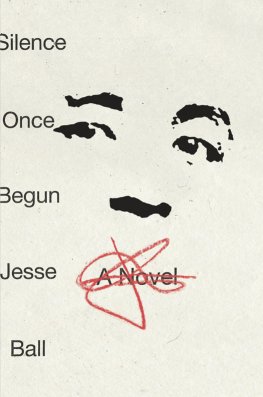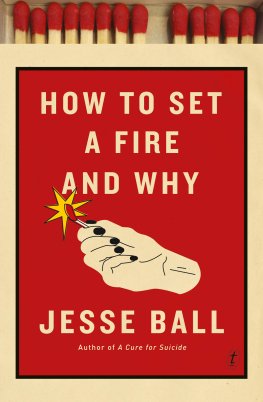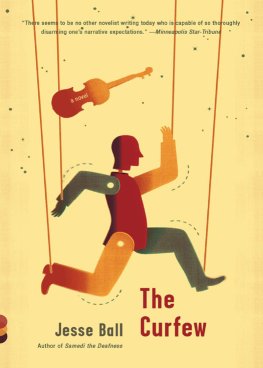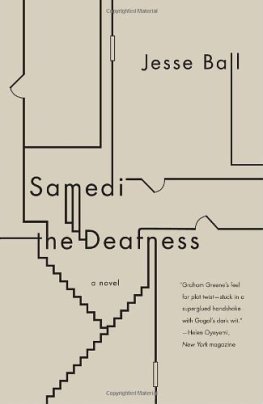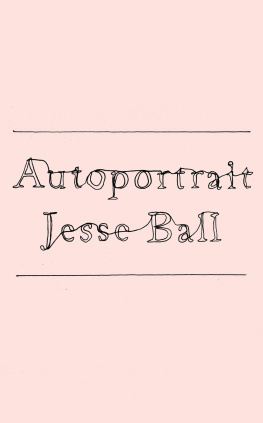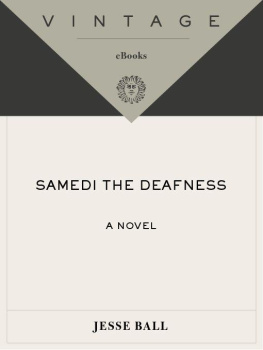Jesse Ball
Silence Once Begun
For K. Abe & S. Endo

The following work of fiction is partially based on fact.

A strange thing happened to me, to me and to the woman with whom I was living. We were in the midst of a fine life. I would look out ahead and I could see how shining, how beautiful the world was and would be. I had let go of many fears, concerns, worries. I felt many matters had been solved. We lived in a house with our daughter, we had been married for several years, and the life was so glad and bright, I cant tell you. I can say it, but you dont know, or I dont know how to say it correctly. There was a garden before our house with a high gate and trellis all around. We would sit there in the garden and there was time enough for everything, for anything at all. I wish for you to guess and feel the light, as if in morning, on your eyelids.
Something happened, however, something I did not foresee. She fell silent, simply stopped wanting to speak, and that life came to an end. I clung to it, though it was gone, and sought after all understanding that could be had of silence, of who becomes silent and why. Yet it was finished. I had to begin anew, and that beginning lay in trying to understand what had happened. Of course, such things arent easy. No one can simply tell you what it is you dont understand, not with a matter as strange as that.
So, I began to seek after all such occurrences. I traveled to places, spoke to people; again and again I found myself without a way forward. I wanted to know how to avoid the unforeseeable troubles that come. Of course, it was silly. They cant be avoided. It is their nature. But, in my seeking, I found out about the matter of Oda Sotatsu. That led to the book you now hold in your hands. I am glad to present it to you, and I hope that it may do some good.
+
An incident occurred in a village near Sakai in Osaka Prefecture. I call it an incident because it is so singular. At the same time, as you will see, there are elements that make it common to all who share our human life. When I read of it, many years after it had happened, I traveled there to unearth what more I could and discover the full story.
Most of the principals were still living, and over a series of interviews, I gathered the material that now allows me to relate this tale. The names of the individuals involved have been changed to protect their identities and the identities of their loved ones and descendants. Dates, as well as particular periods of time, have also been altered as a further protection.
++
In the pages that follow this, I may occasionally refer to myself as Int. or Interviewer, or may give a note to elucidate some situation. However, most of the books text is drawn from interviews recorded via tape-device. The book is in four accounts: the first from various people connected with (2) Oda Sotatsu, including family members and members of the metropolitan (Sakai) and local police; the second of my search for Jito Joo; the third from (3) Jito Joo; and the fourth from (1) Sato Kakuzo.
The first two sections are by necessity a narrative, with the data bound together and expressed in an at times novelistic fashion (although trouble has been taken to indicate sources). The latter sections for the most part do not necessitate this failing, as the materials alone proved sufficient to my task.
Jesse Ball, Chicago, 2012
1. The Situation of Oda Sotatsu
A First Telling of the Story
Oda Sotatsu was a young man in October of 1977. He was in the twenty-ninth year of his life. He worked in an office, an import/export business owned by his uncle. They principally sold thread. To do this, they bought thread also. Mostly for Sotatsu it was buying and selling thread. He did not like it very much, but went about it without complaint. He lived alone, had no girlfriend, no pets. He had a basic education and a small circle of acquaintances. He appears to have been well thought of. He liked jazz and had a record player. He wore simple, muted clothing, ate most meals at home. The more passionately he felt about a subject, the less likely he would be to join a discussion. Many people knew him, and lived beside him, near him but few could say they had any sense of what he was really like. They had not suspected that he was really like anything. It seemed he merely was what he did: a quiet daily routine of work and sleep.
The story of Oda Sotatsu begins with a confession that he signed.
He had fallen in with a man named Kakuzo and a girl named Jito Joo. These were somewhat wild characters, particularly Sato Kakuzo. He was in trouble, or had been. People knew it.
Now this is what happened: somehow Kakuzo met Oda Sotatsu, and somehow he convinced him to sign a confession for a crime that he had not committed.
That he should sign a confession for a crime that he did not commit is strange. It is hard to believe. Yet, he did in fact sign it. When I learned of these events, and when I researched them, I found that there was a reason he did so, and that reason is he was compelled to by a wager.
There were several accounts of how that evening went. One was the version that had been in the newspapers. Another was a version told by Oda Sotatsus family. Still a third was the version held to by Sato Kakuzo. This final version is stronger than the others for the reason that Kakuzo taped the proceedings and showed the tape to me. I have listened to it many times, and each time, I hear things that I have not heard before. One has the impression that one can know life, actual life, from its simulacrums by the fact that actual life constantly deceives and reveals, and is consistent in doing so.
I will describe for you the events of that evening.
When I listened to the tape, the conversation was, in places, difficult to make out. The music was loud. As the night wore on, the party drank and spoke quite rapidly. In general, the atmosphere was that of a bar. Someone (Joo?) repeatedly gets up, leaves, returns, scraping her chair loudly against the wooden floor. They spoke inconsequentially for about forty minutes, and then they reached the matter of the wager.
Kakuzo led into it quietly. He spoke fluidly and described a sort of comradeship that they shared, the three of them. He acted as though they were all fed up with life. Joo and he, he said, had been doing things to try to escape this feeling. One of those things was to wager on cards, in a private game between the two of them. He said when he would lose, he would cut himself. Or Joo would cut herself, if she should lose. He said they went from that to other things, to forcing each other to do things, in order to feel alive again. But it all revolved around the wagering, around letting life hang in a balance. Did Sotatsu not think that was fascinating? Was he in no way stirred to try it?
All night, they were at him, Joo and Kakuzo, and finally, they convinced him. In fact, they had chosen him because he had appeared to them as someone who might be convinced, who could be convinced of such a thing. And indeed, it proved true; they were able to make him join their game.
He and Kakuzo made a wager. The wager was that the loser, whoever he was, would sign a confession. Kakuzo had brought the confession. He set it out on the table. The loser would sign it, and Joo would bring it to the police station. All that one could feel in life would be gathered up into this single moment when the wager went forward and ones entire life hung on the flip of a card. Kakuzo had brought the cards as well, and they sat there on the table beside the confession.

